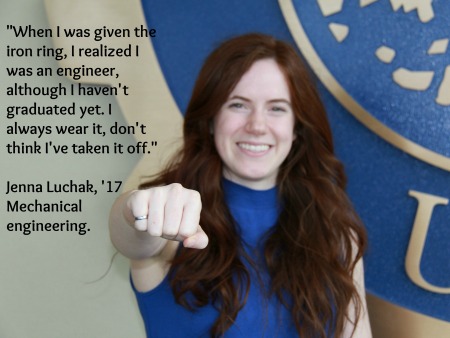
UAlberta mechanical engineering graduate Jenna Luchak is heading to Imperial College, London, to work on a graduate degree in biomedical engineering.
(Edmonton) It might have been an observant family friend, a LEGO League competition, or Women in Scholarship, Engineering, Science and Technology (WISEST) that piqued Jenna Luchak's interest in engineering early in her life.
But it wasn't until later in her undergraduate life - her last engineering co-op placement - that Luchak discovered the passion and confidence to feed her engineering potential.
"I was speaking with Miguel [Luchak's engineering co-op placement supervisor] and he mentioned that it's really important to love what you do as a career, and to never be too hard on yourself. When I mentioned that I was interested in working in biomedical field, but thought I wouldn't be smart enough to go into the field, he encouraged me to not limit myself before I even gave it a fair shot," said Luchak, who is graduating with a degree in mechanical engineering.
"This advice helped me because I have a bad habit of second-guessing myself."
Now, with a freshly minted degree in mechanical engineering, 20 months of hands-on engineering experience, and a ticket to London, England, in her pocket, Luchak is starting a master's degree at the top-ranked Imperial College of London.
Graduate degree is essential
"What excites me most about starting a graduate degree is being able to learn more about a specialized type of engineering. When you go to the biomedical industry, you can't do much in terms of research unless you have a master's or a PhD degree," said Luchak.
Luchak didn't envision a graduate degree in England when she first set foot on campus.
Following a family friend's prophecy and cherishing a Grade 6 memory of programming an Arduino project, she set her sights on electrical and computer engineering. But after watching mechanical engineering students taking part in a robotics vehicle competition as part of their Mechanical Engineering 260 course, she changed her mind.
"MecE 260 competition motivated me to go into mechanical engineering," said Luchak .
Throughout her program, not only did Luchak learn the nitty-gritty behind mechanical engineering, but also completed three paid engineering co-op placements with Alberta Innovates, Halliburton, and Wenzel Downhole Tools. She spent 20 months discovering multiple facets of the profession, gaining hands-on engineering experience, and also learning about what makes her tick.
"I learned what I didn't like-I didn't like electrical and computer engineering, and I didn't like the oil and gas industry," said Luchak. "It's important to be honest with yourself and with your supervisor about what you like and what you don't like."
Grade 5 career advice
Now Luchak is excited about starting her graduate student career at Imperial College. The engineering journey that started in elementary school is taking her to an unexpected destination.
"When I was in Grade 5, a family member noticed that I really liked math and science, and he said: 'You should be an engineer.'"
That's precisely what happened. She and her fellow graduates were recently presented with their iron rings-symbols of the dedication to high standards and ethical conduct engineers practice in service of the public.
"When I was given the ring I realized that I was an engineer, although I haven't (officially) graduated yet," she said. "I always wear it. I don't think I've taken it off."
Reflecting on her experiences at the Faculty of Engineering, Luchak encourages students to show initiative, find a support system, and don't be afraid to say 'I don't understand'.
"Remember that there are many resources for help out there. If you're having trouble, ask for help-sometimes things don't come easy in engineering," said Luchak.